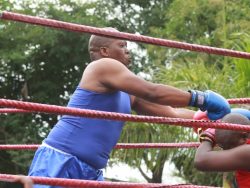Sports is a major economy booster
…there are many intrinsic and other benefits in sports
SHUKUMA ESWATINI
(By ESRC Communications)
Shu…Shukuma Eswatini!
We are the Eswatini Sport and Recreation Council (ESRC), here to serve no one but the nation.
Greetings and welcome to another edition of your favourite column, Shukuma Eswatini.
Sport has always been an important part of the society but it is now becoming an increasingly important part of the economy. Sports make a huge contribution to the lives of individuals to the society and to the economy of the country, mostly through sports tourism, in particular hosting of international sports events. There are three main income streams for sports leagues: broadcasting (sales of media rights), commercial (sponsorship and advertising) and match day revenue (ticketing and hospitality).
Sports tourism
The sporting fraternity has got high level competitions some of which are hosted by Eswatini. Through the hosting of such events, contributions towards those events are made and the economy is enhanced in the process. International events like the Kings’ Cup, Ingwenyama Cup and Imbube Marathon to name a few, attract thousands of tourists/visitors to the Kingdom of Eswatini thus enhancing the economy of the country through accommodation of tourists, food and beverages, transport to name a few.
King’s Golf Cup – the Kings Golf Cup is an annual event hosted in the country through the Eswatini Golf Union. International golfers and tourists from all over the world attend this event
Ingwenyama Cup – the Ingwenyama Cup is a football tournament which also occurs annually and includes cultural activities like Ummiso, Ingadla, sibhaca and performances by international artists. This event attracts thousands of people into the country.
Imbube Marathon – In collaboration with Eswatini Athletics, the Eswatini National Provident Fund hosts the Imbube Marathon which is also an annual event.
It is noteworthy that the individual prize monies from these events are taxable which is an enrichment towards the country’s economy.
A Healthy nation is a wealthy nation
A healthy nation they say is a wealthy nation. The benefit of sports includes the well-being of individuals taking part, improved health and a reduction in youth crime. There is evidence that sport’s benefits go far beyond the positive health effects of physical activity that have been understood. A growing body of international research suggests that community sport also contributes to social goals including education, child and youth development, social inclusion, crime prevention and economic development.
In in the wake of the emerging coronavirus pandemic, the sporting calendar has been upended. To safeguard the health of athletes and others involved, most major sporting events at international, regional and national levels have been cancelled or postponed. The suspension of the international events has caused devastating economic losses for sports.
Football
The Federation International Football Association (FIFA) is the world’s most widely viewed sporting event. In 2006, the FIFA World Cup was held in Germany, 714 million people watched the final match. This is where Italy played against France. In 2010, the FIFA world cup was held in South Africa and this was broadcasted to 204 countries on 245 different channels. In 2010, the final was between Spain and Netherlands, the score was 1 – 0 in favour of Spain. In 2014, Germany played against Argentina in the finals and the score was 1 – 0 in favour of Germany. In 2018, France played against Croatia and France won 4 – 2.
The events listed above have a positive effect on tourism as millions of people travel to the venues where the events are held. That is to say, in this way transport and accommodation are boosted.
Cricket
In 2017, the Eswatini Cricket Association related that in order to improve the standard of cricket in the country, the local association has to align with the International Cricket Council (ICC) based in Dubai. The following has to be in place;
- Education – (for coaches, umpires and curators
- Tournaments
- Indigenous players’ development
- Juniors’ Involvement and Competitions
- Women’s Cricket
- Facility Development
This will ensure that Cricket functions professionally and is able to attract the local population and tourists.
The success of the above requires Communication.
Communication
Barriers of Effective Communication
- Physical – physical handicaps, noise distractions
- Language – jargon, technical terms
- Anxiety – threat, fear, suspicion, uncertainty – communication breaks down when these are present
- Status, power, authority, and rank influences the receptivity of communicating
- Personal hostilities and needs – old feuds and habitual fixed positions on issues
- Shyness, feelings of inadequacy
- Style of participation – too much, too loud, too little, irrelevant
- Defensiveness – protectiveness, adamant about some ideas even though obsolete in light of new data
Types of Communication
- One-way
- The administrator is giving information or directions. Immediate feedback is not requested or required. Communications in this category include announcements, news releases, programme information, etc. One-way communication has a number of prerequisites and limitations.
- the message must be written in simple clear language
- it must be short, yet clearly convey the ideas presented
- the information must be understandable, easily interpreted, of interest to the reader and pertinent
- Two-way Communication
- The administrator is sending information but requests or requires immediate feedback. Communications in this category include face-to-face contact (i.e. meetings and conferences); Advantages of this type of communications are;
- misunderstood issues can be cleared up immediately
- the administrator is able to give as little or as much information as required and can adjust this on an individual basis
- facial and body language may clarify and/ or enhance the message. This same body language may serve to create misinterpretation. The communicator must be careful to convey a consistent body and verbal/written communication
Contact us:
Business Development Manager: Zama Tsabedze zama@sportscouncil.org.sz 76032636
Media Officer: Dumisani Ntiwane ntiwane@sportscouncil.org.sz 76691992/79691992
Marketing Officer: Zwakele Simelane zwakele@sportscouncil.org.sz 76072323
QUOTE OF THE WEEK
“Be not afraid of life. Believe that life is worth living and our belief will help create the fact” – Henry James
We will talk to you again next week, until then Shukuma Eswatini!


Leave us a reply